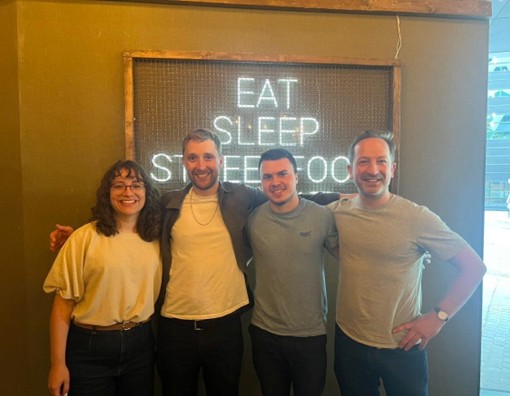Our PGRs’ Experience at the SysMus25 Conference
From the 11th-13th of June 2025 some of our wonderful postgraduate researchers from the School of Music, with research interests in music science and musicology, attended the 18th International Conference of Students of Systematic Musicology (SysMus25). SysMus is an annual conference run by and for students in the broad field of systematic musicology. SysMus provides a fantastic opportunity for Master’s, PhD and early-career postdoctoral researchers to connect, share knowledge across institutions and disciplines, and get feedback on their research from peers and experts. The event covers a wide range of topics from music psychology and music perception to music education and music analysis, as well as many more! SysMus takes place at different international venues year on year and allows opportunities for delegates to connect with peers from all over the world. This year the event was held in the RITMO Centre for Interdisciplinary Studies in Rhythm, Time and Motion at University of Oslo, an internationally leading centre for music research.

PGRs from the School of Music at the SysMus25 conference dinner (left to right: Bruna Martins, James Cannon, Rhun Gwiylm, Michael Solomon-Williams).
One of the highlights of the conference was the opportunity to engage with keynote talks delivered by leading researchers in the field. Nicola Dibben (University of Sheffield) opened the conference with an inspiring talk titled “Ecomusicking: How Musical Encounters Shape Environmental Thinking”, exploring how particular musical experiences can foster pro-environmental attitudes and behaviours. Anja Volk (Utrecht University) gave a keynote on “Computational Modelling of Music Information”, showing how musicological research on structure can inform the development of interactive technologies for music engagement. Finally, Bruno Laeng (University of Oslo) delivered a compelling keynote entitled “Measuring Chills... ‘Defrosting’ and ‘Dissecting’ Them” exploring the science of musical frissons. The conference also featured great opportunities for learning and research-based skills development in the form of hour-long workshops led by experts. These included workshops on exploratory analysis strategies for physiological measurements from live concert participants (led by Finn Upham) and on phenomenologically grounded approaches to researching live music listening experiences (led by Remi Martin).
This year, our PGRs presented a mix of oral and poster presentations at the conference, on a variety of different topics related to their respective PhD projects. First up, Bruna Martins presented “The Choir Experiences of People Affected by Homelessness: Observational Insights”, exploring the ways in which people affected by homelessness engage in choirs and the possible outcomes of their engagement (a WRoCAH-funded collaborative project with The Choir with No Name, based in Sheffield). Next up, Rhun Gwilym presented a poster presentation titled “The Exploration of How a UBI Model Would Affect the Behaviours of EDM Artists and if a Credible Way Forward in the UK” as well as an oral presentation, “A New Way of Thinking: A Proposed Methodology for EDM (Electronic Dance Music) Analysis”, outlining a proposed novel descriptive methodology for the analysis of EDM tracks. Finally, James Cannon and Michael Solomon-Williams both presented posters, with James presenting “Feelings in Motion: Embodiment, Emotional Synchrony and Social Connection on the Dancefloor (A Large-Scale Survey Study)” which detailed results from an online survey study exploring relationships between emotional experiences and social connection at electronic dance music events. Michael, on the other hand, presented a poster entitled “The Beat Goes On: Jazz, Dance and Community in the work of Wilfrid Mellers” showcasing how Wilfrid Mellers’ innovations anticipated key developments in music education, and how renewed attention to his work may help address current challenges facing the music education sector.

Bruna Martins presenting at SysMus25
True to its reputation, SysMus fostered a vibrant, friendly, and welcoming atmosphere. Beyond the academic program, we enjoyed exploring beautiful, sunny Oslo together (yes, it was surprisingly sunny and warm the whole time!) and took part in an exciting social program scheduled by the organisers. Highlights included a welcome swing dance, a fun and informal conference dinner at a local food hall (complete with private bar!), and, on the last day, a Springar dance workshop - an introduction to traditional Norwegian folk dancing. What a wonderful end to the conference.
On a personal note, I’ve been involved with SysMus since 2021, when I first attended and presented my MA research before having applied for doctoral study (thanks to the recommendation of Emily Payne). That first experience was hugely influential, motivating me to pursue the PhD and secure some funding, which I did the following year! This year, as I approach the final stages of my PhD, reconnecting with familiar faces from that first conference felt like a full-circle moment. Four years on from that first conference, I’m now privileged to serve as chair of the SysMus Executive Committee, helping to oversee the conference series and its wider community, something that grew out of my long-standing involvement and from helping to organise SysMus23 in Sheffield. For any postgrad student in music science or systematic musicology, I can’t recommend SysMus enough. I know many of us in Leeds are already looking forward to SysMus26, not far up the road in Durham!
You can find out more about SysMus here: https://sites.google.com/view/sysmus/home

Attendees of the SysMus25 conference outside of the Norwegian Houses of Parliament in Oslo.
words by James Cannon
